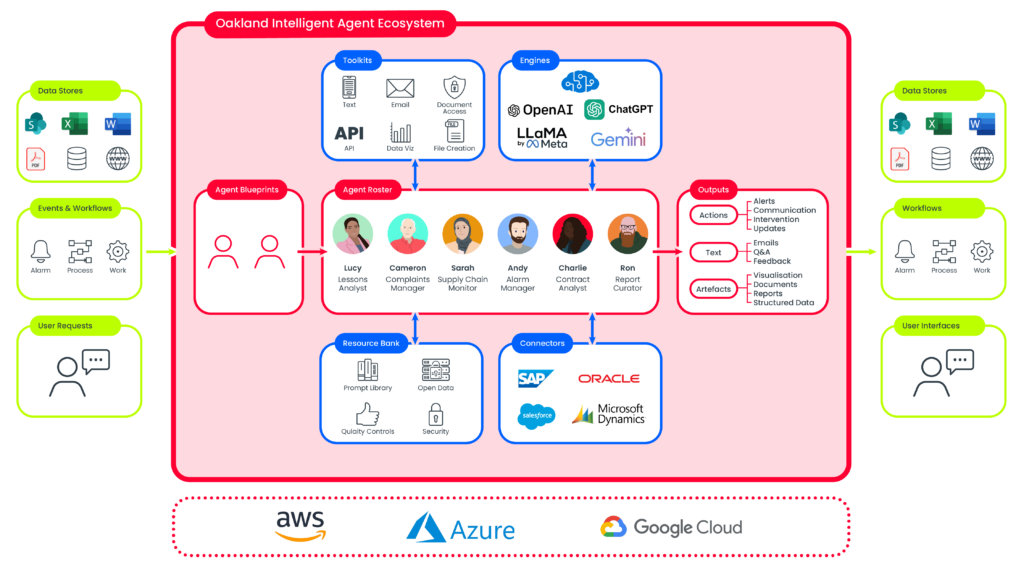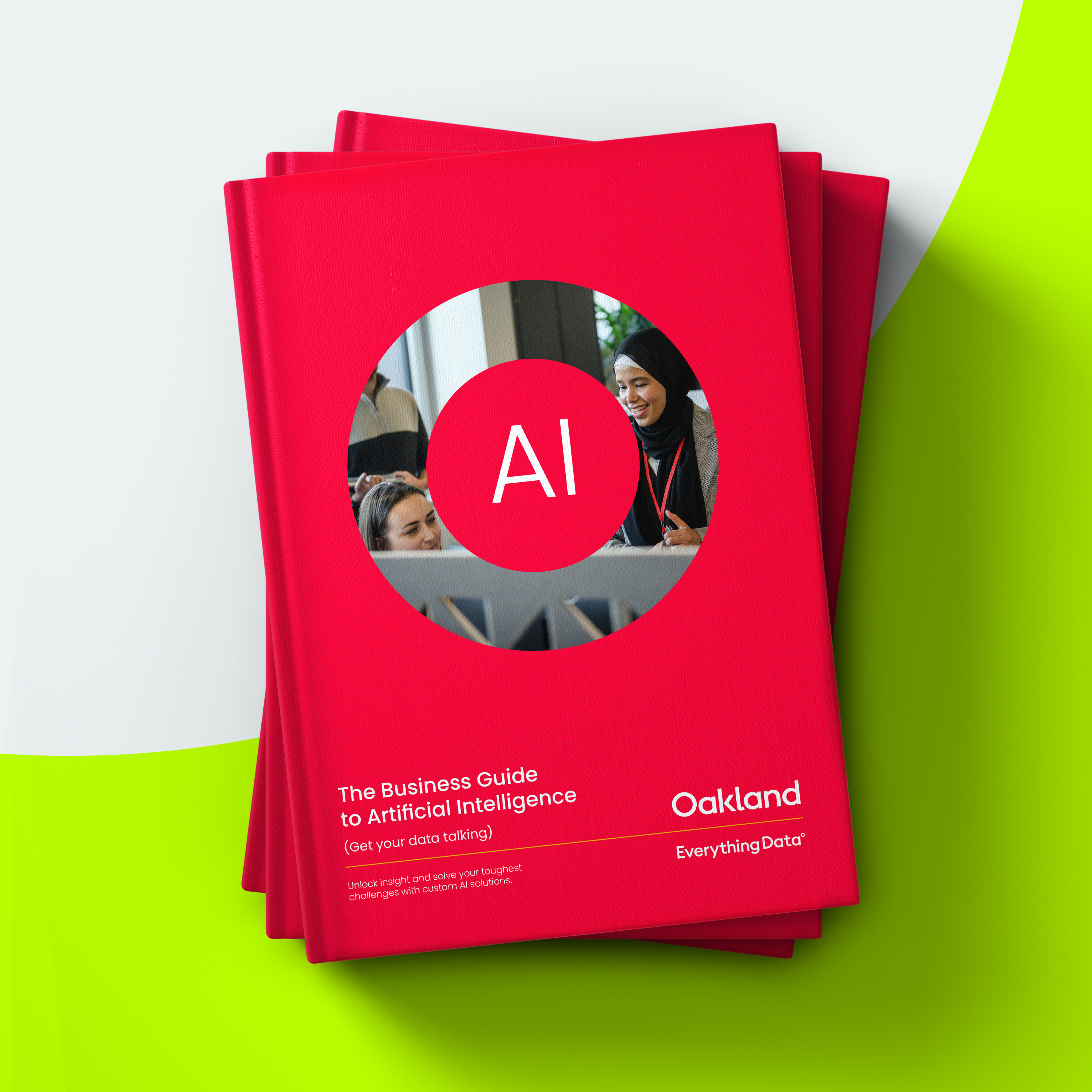We Build Custom AI Solutions Powered By Intelligent Agents
Intelligent Agents are advanced AI-powered virtual workers designed to execute complex tasks, mimicking human decision-making processes. By embedding these agents into your business operations, you unlock the potential of AI intelligent agent technology, scaling your capabilities and driving innovation. Discover the benefits of integrating AI solutions into your business, from operational efficiency to enhanced AI lead generation.
Learn the benefits of Intelligent Agents, their uses and how Oakland tailors AI solutions to you in our blog, Why We Recommend the Intelligent Agent Approach to AI.

Our Intelligent Agent Ecosystem
Oakland’s Intelligent Agent Ecosystem offers rapid deployment of pre-trained intelligent agents equipped to solve real-world business challenges. Our artificial intelligence services can transform your business operations by addressing specific use cases, whether as standalone solutions or as part of a multi-agent system.
Thanks to our cutting-edge research, we can deploy an ecosystem of highly configurable intelligent agents pre-trained and equipped to solve real-world problems. These are ready to deploy in weeks, not months.
Our agents can be deployed as standalone workers or as multi-agent ‘teams’ that work together across your business.

Meet the AI agents
Our intelligent agents are divided into three cohorts: Knowledge Analysts, Process Guardians, and Business Partners. These AI-powered agents offer robust solutions that can tackle challenges ranging from unstructured data analysis to lead generation AI.
So book a demo to see one of our agents in action.

So much insight is locked away in unstructured, free text documentation that overwhelms users. Our Knowledge Analyst agents make knowledge accessible, proactively sharing insights and alerts that are easy for users to consume.

LucyLessons Analyst
Challenge
The same mistakes occur time and again in business because knowledge isn’t shared. Often, hours are spent gathering ‘lessons learned’ and best practice. But these documents then gather dust. The information is just too big and messy for anyone to use it. Important lessons are lost in the noise.
What our agent does
Lucy is a highly scalable, proactive librarian. She can conduct a focused search of a lesson library and return tailored user insights. Lucy can also proactively identify new lessons or projects, using her tooling to connect users to insights they were not aware of.

CameronComplaints Manager
Challenge
Complaint volumes, process complexity and messy documentation often overwhelm automated complaint systems or overstretched human teams. But, complaint handling is critical to avoid reputational and financial damage. Rapidly assessing and actioning complaints is crucial but highly challenging.
What our agent does
Cameron is an always-on complaint manager. Cameron scans and evaluates the entire complaints backlog for risk and non-compliance. Cameron highlights risks and uses his reasoning to identify resolutions and provide insights. Cameron can proactively identify and alert users to new or unresolved complaints in real-time.
Many businesses have invested in monitoring systems but now face an overwhelming volume of alerts and alarms. Imagine if you had a team of experts with near-infinite memory and an endless attention span constantly monitoring your business? That’s what our Process Guardian agents do. They can spot hidden issues, slash response times and free your teams to focus on solving.

SarahSupply Chain Monitor
Challenge
Even small quality issues can disrupt entire supply chains if not resolved quickly. Rapidly assessing the downstream impacts and alerting the right people is critical. But these maps often don’t exist and can’t be made quickly. So, communications can’t be directed and issues spiral out of control.
What our agent does
Her AI capabilities allow Sarah to read and analyse complex product specs, supply chain data and organisational charts. Sarah can monitor quality issues in real-time, rapidly assessing downstream impacts and proactively alerting impacted teams. Sarah can carry out human-like quality management tasks but also has a near-limitless memory and attention span.

AndyAlarm Manager
Challenge
Many businesses have invested heavily in alarms and telemetry to monitor their assets. But the volume and velocity of these alerts is so high that control teams are often overwhelmed. Triage and prioritisation cannot happen quickly enough. Scattered documentation and complex rules add further difficulty. The result is critical alerts are missed entirely or mis-handled.
What our agent does
Andy, an Alarm Manager agent, is trained on alert handling protocols. Andy is given tooling to enable analysis of alerting data in real-time. This allows Andy to act as a triage agent for asset control operatives. Andy interprets and filters incoming alerts, proactively making simple fixes and passing higher-priority cases on to control operatives. This frees up human operatives from having to try and consume an overwhelming volume of incoming alerts.
Data is so often meaningless without context. But applying context is time consuming. How many warning signs are lost in the data or missed because nobody spots their relevance? What if you could find the time to tailor reporting and insights to every user, every time? Our business partner agents are always-available, expert guides to the facts. They’ll take the insight to you.

CharlieContract Analyst
Challenge
Maintaining a clear sight of your contract base is key to customer and supplier management. But inconsistent contract formats, bespoke terms and fragmented filing are common. This makes finding and interpreting contracts at speed and scale nearly impossible for humans. Many companies operate ‘blind’ to their risks and detailed obligations.
What our agent does
A contract analyst (Charlie) can read and analyse a business’ entire contract base. This allows Charlie to create and document a structured map of contractual entitlements and obligations. This creates an overall picture of the contract portfolio. Charlie can also then monitor live commercial and operational data and advise on emerging risks and issues.

RonReport Curator
Challenge
Management reporting is often presented ‘cold’ without context or informative commentary. This means the audience either cannot see key messages or find their reports irrelevant. Engagement with reporting is low. Expert business partners or analysts can create much richer reports, but they are often unavailable or unaffordable.
What our agent does
A report curator (Ron) integrates with multiple data sources. Using its data visualisation tools, Ron prepares tailored reporting and commentary for key user groups. Continuously available, Ron can also answer follow-up questions via a natural language interface. Users can also request Ron to alert them to emerging trends or when certain events or triggers are met.

The AI Opportunity Case Study
Network Rail: Revolutionising knowledge management through Generative AI
Working together with Network Rail, Oakland is leveraging Generative AI to increase the adoption of vital organisational learning from a vast, under-utilised ‘lessons learned’ library.
For more information on how Oakland used AI to help the UK’s largest rail authority, read our case study here.

AI has the potential to transform your business. Contact our experts today and start your journey.
FAQs
What is artificial intelligence?
Artificial Intelligence (AI) leverages algorithms and software to perform tasks traditionally requiring human cognition, such as language comprehension, pattern recognition, and data-driven decision-making. A pivotal element within AI is machine learning (ML), where systems improve accuracy over time by learning from data.
AI’s evolution has been driven by advances in algorithms, the explosion of data due to digital transformation, and the scalability of cloud computing, offering tangible business benefits and ROI.
What is an Intelligent Agent?
An Intelligent Agent is an advanced AI program that extends the capabilities of large language models (LLMs) with specialised tools, task orientation, and precise training.
This lets them interpret, plan, and execute complex tasks in fast-moving business environments. Intelligent Agents seamlessly integrate into existing processes, allowing organisations to develop AI solutions that align with their operational pace and complexity, ensuring sustained value after implementation.
For a deeper understanding of our Intelligent Agent approach, read our guide.
Which cloud platforms and technologies are compatible with your Intelligent Agents?
Our solution is designed for flexibility, working seamlessly across all major cloud platforms, including Microsoft Azure, AWS, and GCP.
We can integrate tools from your chosen provider and build Intelligent Agents using various Large Language Models (LLMs) and AI services, such as Azure AI Search. Whatever you need your agents to work alongside, we can tailor your solution to your users’ needs.
How do Intelligent Agents differ from Co-Pilot or ChatGPT?
While tools like Copilot and ChatGPT offer basic generative AI capabilities, mainly for simple Q&A interactions, Intelligent Agents go further.
They provide tailored, advanced problem-solving by understanding context, taking proactive actions, and handling complex reasoning, making them ideal for sophisticated use cases.
Do Intelligent Agents experience hallucination issues?
Our Intelligent Agents are engineered to minimise hallucinations, a common issue in generative AI that can reduce trust in their outputs.
We deliver accurate results through careful data selection, task-focused training, and precise prompting. On top of that, our agents provide source citations where applicable, enhancing trust and reliability.
How can I trust that Intelligent Agents produce accurate outputs?
Intelligent Agent outputs are fully transparent, letting you view interactions, request additional information, or verify responses through citations. This transparency and generative AI’s adaptability ensure that outputs can be quickly corrected and refined for quality assurance.
Are all AI solutions required to be Intelligent Agents?
Not every AI solution needs the sophistication of Intelligent Agents. Depending on the complexity of your use case, simpler AI tools or interfaces might suffice. Intelligent Agents are highly configurable, allowing them to coexist with less complex solutions when appropriate.
Will my data be owned by the AI technology providers if I use Intelligent Agents?
No, your data remains yours. We recommend creating private instances of generative AI models, whether commercial or open-source, to underpin your Intelligent Agents. That way, you can be sure that your data is totally secure and stays within your organisation.
How does data quality affect the performance of Intelligent Agents?
The quality of training data is crucial to Intelligent Agent performance. However, their advanced reasoning capabilities can mitigate data quality issues by assessing multiple data sources to provide well-rounded, accurate outputs, even when the data is imperfect.


